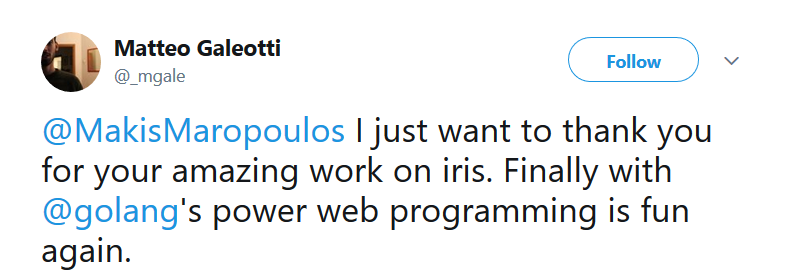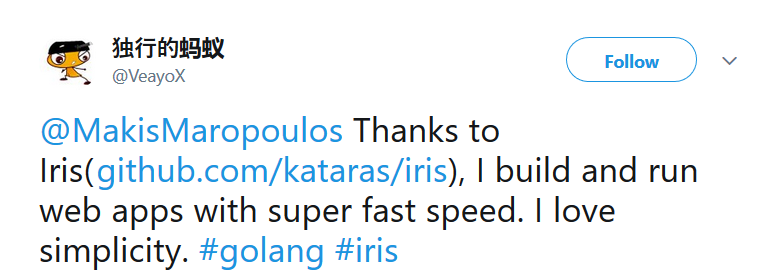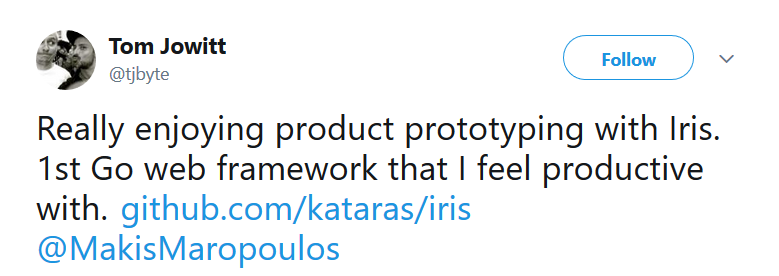Iris Web Framework 









Iris is a fast, simple yet fully featured and very efficient web framework for Go.
Iris provides a beautifully expressive and easy to use foundation for your next website or API.
Finally, a real expressjs equivalent for the Go Programming Language.
Learn what others say about Iris and star this github repository to stay up to date.
Backers
Thank you to all our backers! 🙏 Become a backer

$ cat example.go
package main
import "github.com/kataras/iris"
func main() {
app := iris.New()
app.RegisterView(iris.HTML("./views", ".html"))
app.Get("/", func(ctx iris.Context) {
ctx.ViewData("message", "Hello world!")
ctx.View("hello.html")
})
app.Get("/user/{id:long}", func(ctx iris.Context) {
userID, _ := ctx.Params().GetInt64("id")
ctx.Writef("User ID: %d", userID)
})
app.Run(iris.Addr(":8080"))
}
Learn more about path parameter's types by clicking here
<html>
<head>
<title>Hello Page</title>
</head>
<body>
<h1>{{.message}}</h1>
</body>
</html>
$ go run example.go
Now listening on: http://localhost:8080
Application Started. Press CTRL+C to shut down.
_
Installation
The only requirement is the Go Programming Language
$ go get -u github.com/kataras/iris
Iris takes advantage of the vendor directory feature. You get truly reproducible builds, as this method guards against upstream renames and deletes.

Updated at: Tuesday, 21 November 2017
Benchmarks from third-party source over the rest web frameworks

Support
- HISTORY file is your best friend, it contains information about the latest features and changes
- Did you happen to find a bug? Post it at github issues
- Do you have any questions or need to speak with someone experienced to solve a problem at real-time? Join us to the community chat
- Complete our form-based user experience report by clicking here
- Do you like the framework? Tweet something about it! The People have spoken:










For more information about contributing to the Iris project please check the CONTRIBUTING.md file.
List of all Contributors
Learn
First of all, the most correct way to begin with a web framework is to learn the basics of the programming language and the standard http capabilities, if your web application is a very simple personal project without performance and maintainability requirements you may want to proceed just with the standard packages. After that follow the guidelines:
- Navigate through 100+1 examples and some iris starter kits we crafted for you
- Read the godocs for any details
- Prepare a cup of coffee or tea, whatever pleases you the most, and read some articles we found for you
Iris starter kits
Did you build something similar? Let us know!
Middleware
Iris has a great collection of handlers[1][2] that you can use side by side with your web apps. However you are not limited to them - you are free to use any third-party middleware that is compatible with the net/http package, _examples/convert-handlers will show you the way.
Iris, unlike others, is 100% compatible with the standards and that's why the majority of the big companies that adapt Go to their workflow, like a very famous US Television Network, trust Iris; it's up-to-date and it will be always aligned with the std net/http package which is modernized by the Go Authors on each new release of the Go Programming Language.
Articles
Video Courses
- Daily Coding - Web Framework Golang: Iris Framework by WarnabiruTV, source: youtube, cost: FREE
- Tutorial Golang MVC dengan Iris Framework & Mongo DB (19 parts so far) by Musobar Media, source: youtube, cost: FREE
- Go/Golang 27 - Iris framework : Routage de base by stephgdesign, source: youtube, cost: FREE
- Go/Golang 28 - Iris framework : Templating by stephgdesignn, source: youtube, cost: FREE
- Go/Golang 29 - Iris framework : Paramètres by stephgdesign, source: youtube, cost: FREE
- Go/Golang 30 - Iris framework : Les middelwares by stephgdesign, source: youtube, cost: FREE
- Go/Golang 31 - Iris framework : Les sessions by stephgdesign, source: youtube, cost: FREE
Get hired
There are many companies and start-ups looking for Go web developers with Iris experience as requirement, we are searching for you every day and we post those information via our facebook page, like the page to get notified, we have already posted some of them.
License
Iris is licensed under the 3-Clause BSD License. Iris is 100% free and open-source software.
For any questions regarding the license please send e-mail.
























